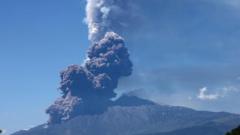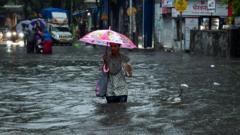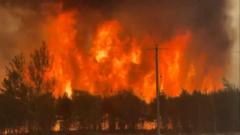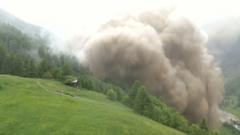**Over 17,000 evacuees have fled amid escalating wildfire activity in Canada, with emergency declarations in affected provinces.**
**Thousands Displaced as Wildfires Rage Across Canada**

**Thousands Displaced as Wildfires Rage Across Canada**
**Severe Fire Conditions Prompt Mass Evacuations Across Manitoba and Saskatchewan**
In a significant crisis, around 17,000 individuals have been forced to evacuate from Manitoba due to the rapid spread of wildfires across Canada. The situation has escalated, with emergency services employing military aircraft and helicopters to facilitate the evacuation of residents, particularly from remote areas. As firefighters combat rising flames, the prospect of hot and dry weather looms, further complicating efforts.
Authorities report over 188 active fires in the region, with alarms echoing from both Saskatchewan and Manitoba, both of which have declared states of emergency and are seeking international aid. Aerial footage showcases substantial smoke plumes affecting vast areas of Canada and even penetrating parts of the United States.
Currently, Saskatchewan is struggling with 17 wildfires, eight of which remain uncontrolled. Premier Scott Moe emphasizes the urgency of the situation, indicating that the current 8,000 evacuees in Saskatchewan could rise as conditions remain dry. Stressing the importance of the upcoming week, he stated that critical weather changes are needed to mitigate the fire risk.
In Manitoba, evacuations include communities such as Pukatawagan, with officials characterizing the events as a "rapidly evolving situation." Teams from the Canadian Armed Forces and local wildfire services are engaged in high-stakes air evacuations, a feat articulated as complex by Prime Minister Mark Carney, owing to the challenging conditions.
In regions like Flin Flon, only emergency responders remain as the fire situation intensifies. Reports indicate 25 active fires in Manitoba, with 11 marked as out of control. Furthermore, meteorological forecasts by Environment and Climate Change Canada suggest that while a cold front may impact some areas, it could also introduce wind that exacerbates fire conditions.
Smoke from the wildfires has led to air quality alerts affecting approximately 22 million Americans, with warnings issued in states like Minnesota about unhealthy air quality levels.
Canada is currently experiencing its worst wildfire season on record, with over 42 million acres burned in 2023. Climate change is increasingly recognized as a critical factor intensifying wildfire prevalence, according to UN assessments which highlight how extreme heat and dry conditions foster wildfire risks.





















